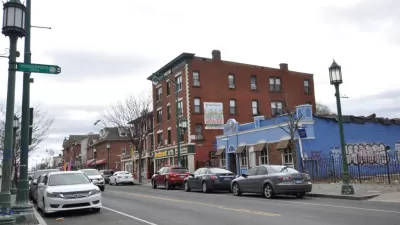Across the country, affordable housing projects depend on tax credits to encourage investment; the possibility of a lower tax rate has already affected their funding.
"Trump hasn’t yet acted on his plan to slash the business tax rate from 35 percent to 15 percent, but the campaign pledge alone is already reshaping how affordable housing developers fund their work," according to Josh Cohen in Next City. Much of the funding for affordable housing comes from Low-Income Housing Tax Credit (LIHTC), which incentivizes businesses to invest in affordable housing in order to get a lower corporate tax rate. These investments fund projects around the country. "For example, of the $23 million that Capitol Hill Housing spent on a recently built 88-unit rent-restricted apartment building, $5.6 million came from LIHTCs," Cohen writes.
If corporate taxes are slashed by more than half, there will be less incentive to invest in these projects. "With a significantly lower tax burden dangling on the horizon thanks to Trump, would-be investors have less incentive to pay top dollar for LIHTCs; developers have already dropped their “asking price” by 10 cents or more per tax credit to compensate," Cohen writes. According to National Low Income Housing Coalition President Diane Yentel, the effects of these proposed tax cuts can already be felt. "Either causing investors to hold off on investments altogether, or to provide less equity per dollar of the credit. In either case, it means less money available for the development of affordable housing," she tells Cohen.
FULL STORY: Trump Tax Promise Is Already Affecting Affordable Housing

Maui's Vacation Rental Debate Turns Ugly
Verbal attacks, misinformation campaigns and fistfights plague a high-stakes debate to convert thousands of vacation rentals into long-term housing.

Planetizen Federal Action Tracker
A weekly monitor of how Trump’s orders and actions are impacting planners and planning in America.

Chicago’s Ghost Rails
Just beneath the surface of the modern city lie the remnants of its expansive early 20th-century streetcar system.

Bend, Oregon Zoning Reforms Prioritize Small-Scale Housing
The city altered its zoning code to allow multi-family housing and eliminated parking mandates citywide.

Amtrak Cutting Jobs, Funding to High-Speed Rail
The agency plans to cut 10 percent of its workforce and has confirmed it will not fund new high-speed rail projects.

LA Denies Basic Services to Unhoused Residents
The city has repeatedly failed to respond to requests for trash pickup at encampment sites, and eliminated a program that provided mobile showers and toilets.
Urban Design for Planners 1: Software Tools
This six-course series explores essential urban design concepts using open source software and equips planners with the tools they need to participate fully in the urban design process.
Planning for Universal Design
Learn the tools for implementing Universal Design in planning regulations.
planning NEXT
Appalachian Highlands Housing Partners
Mpact (founded as Rail~Volution)
City of Camden Redevelopment Agency
City of Astoria
City of Portland
City of Laramie





























